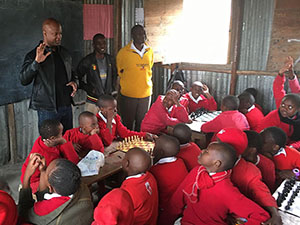


Winning starts with what you know
The new version 18 offers completely new possibilities for chess training and analysis: playing style analysis, search for strategic themes, access to 6 billion Lichess games, player preparation by matching Lichess games, download Chess.com games with built-in API, built-in cloud engine and much more.
Sometimes miracles happen! But first, some background…
Last year, I had the incredible opportunity to make a trip I have always wanted to: a mini-tour of the continent of Africa. It was only three countries – Kenya, South Africa, and Madagascar – but the powerful images and experiences I felt in those three weeks of travel will last me a lifetime.
Africa is a land of paradoxes. The world’s poorest continent, it is rich with history, vibrancy, and energy. Driving through the chaotic streets of Nairobi, Kenya’s capital city and the first I visited, was an experience unto itself: one would think that the pedestrians firmly believe in their invulnerability to speeding vehicles. Couple that with an irrepressible night-life where dancing goes on well past four in the morning (even on Sundays!), and you can see why the city attracts party-goers of all stripes from everywhere in the world. In addition, just a 45-minute plane ride away, it’s easy to relax the days away on beautiful Diani beach, whose white sands and pleasant waves of the crystal blue Indian Ocean quickly melt away any cares one might have brought from the hustle and bustle of so-called civilization.

While scenes like this can leave one in a state of shock, they also contrast with some of the beauty Africa has to offer, such as...
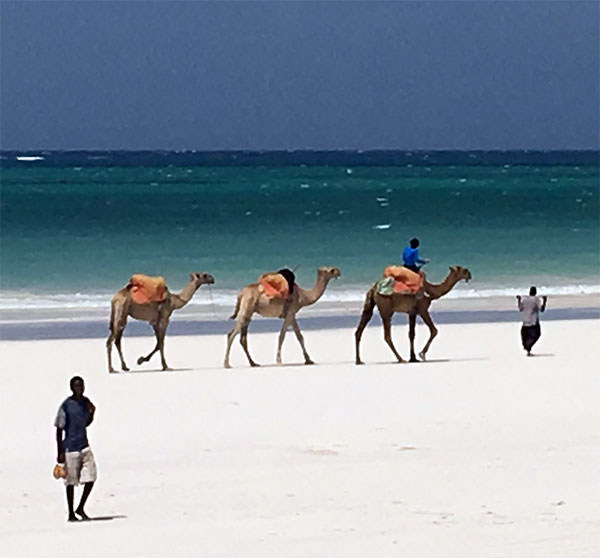
... the breathtaking Diani beach
Sadly, such idyllic conditions are only a temporary respite from more prevalent and harsher realities. Poverty levels in the big cities are quite high, and this was nowhere more evidenced than during my visit to Nairobi’s Mukuru slums, where over 700,000 people live in small and poorly built tin shacks and where walking on unpaved roads and trying to avoid thick sewage and days-old garbage is simply a fact of life. It broke my heart to see the number of unkempt kids, whose parents simply cannot afford to send them to school, sitting around all day with nothing to stimulate their minds. The lost look on their faces reflected their uncertainty of what their future holds in a world that seems to have no interest in their plight.
It may be difficult from afar to appreciate the simultaneous sense of stark despair and insistent hope that permeates the place. While it might be easy to fall prey to the void of desperation that threatens to swallow up souls on a regular basis, there was also an undying and determined optimism amongst the many mothers, fathers and especially the young people who are struggling against all odds to make a better life. This is what often inspires organizations to go in and lend a hand in an effort to help bring about change.

One can sink into despair seeing this, or one can realize how far any help would go...

... and get involved like Maurice Ashley above!
While there are a variety of needs to be addressed, it was heart-warming to see the Kasparov Chess Foundation Africa and Sports Outreach Kenya working together to bring the mind-nourishing benefits of chess to children who could most benefit from the game. The rest of my journey to South Africa and Madagascar only confirmed the urgency of the aid needed in various countries.
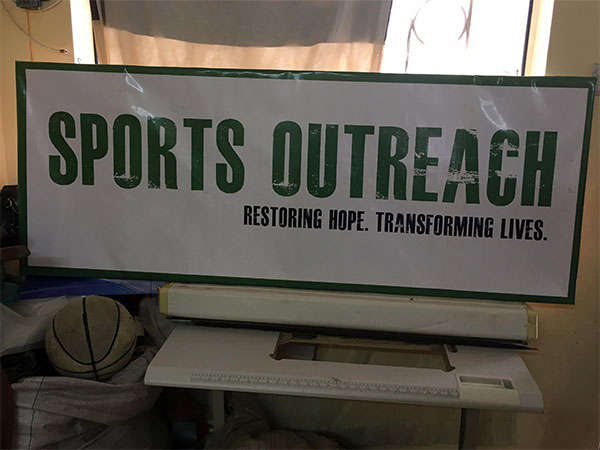
Sports Outreach Kenya is one of the local organziations that uses sports and chess to bring hope

Chess in Africa could be the first step to so many great things...
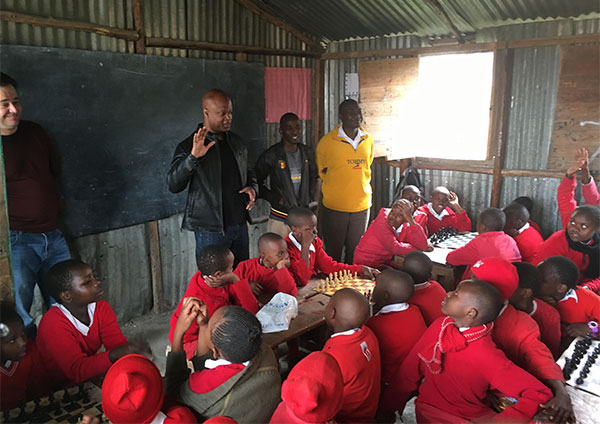
...And seeing it bring light to so much squalor is heartening.
While on the trip, I had many conversations with my host Graham Jurgensen, the head of KCF-A, about what could be done to raise the level and reach of chess around the continent. I could see in Graham’s eyes that he shared a similar desire to effect change, and he has spent the last several years, after leaving a lucrative job in business, traveling from country to country trying to bring the wonders of chess to his home continent (he hails from South Africa). My return home shortly thereafter left me with a feeling of frustration as I sensed that we weren’t any closer to resolving the pressing issues.
Thankfully, I had agreed to volunteer as a coach for the Ivory Coast team at the Olympiad in Baku after their federation president, Dr Essoh Essis pleaded with me to take on this role. It was while at the Olympiad less than two months later that I was appalled to see the lack of competitive play of most of the African teams. I found myself surrounded by players who had a deep passion for chess, but who lacked the resources and infrastructure necessary to compete at the highest levels of the game.
Ivory Coast, who came to Baku with star coach Maurice Ashley #Bakuchess
— Baku Chess Olympiad (@bakuchessol2016) September 1, 2016
(Photos: @davidllada ) pic.twitter.com/nLNUhkQ97i
The geopolitical stratification of the planet was essentially on full display at the tournament. Poorer countries don’t attract Grandmasters or top trainers to help enhance their chess culture nor do they have the resources required for high-end laptops and software that are simply essential to compete. While it was awesome to witness the team from South Sudan tying with the Bulgarian team led by none other than Veselin Topalov, this sort of result was very much the exception rather than the rule.
I was left with no doubt in my mind that many African teams had the talent and drive to succeed in spades, but the question was what to do about the problem of enhanced training. I spent more time with Graham, who was volunteering for Team Ghana at the Olympiad, and we began to fashion a plan that made sense…if only we had the funding.

Watching the children look alive, passionate, and optimistic is payment in itself
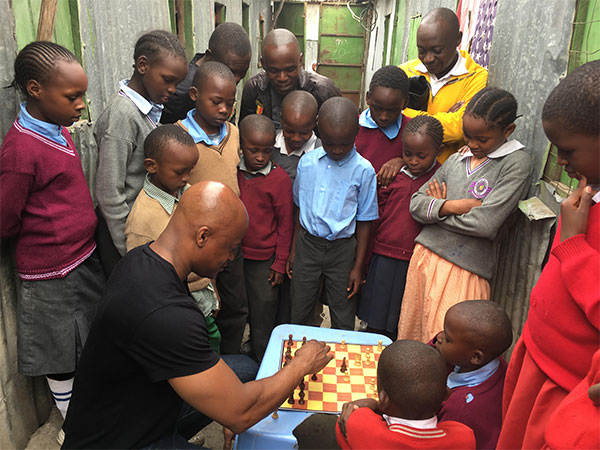
Enter the aforementioned miracle!
Another two months passed before I received a message from Graham telling me that he needed my help to secure a grant. He said that it had the potential to provide the funding that our envisaged project would require. Within less than a week, I was on the phone with two representatives from the Paul Allen Foundation (yes, the Paul Allen, the co-founder of Microsoft!). I found myself expounding on all the challenges I had witnessed first-hand and explaining how a comprehensive chess training program was the thing that could have the greatest impact on the ground. The call took less than an hour, but it took almost another month before I heard back from Graham. The news was incredible… The Paul G. Allen Family Foundation had agreed to provide the necessary funding to facilitate professional training tours for a total of six countries (Kenya, Rwanda, Botswana, Namibia, Tanzania, and Zambia)!
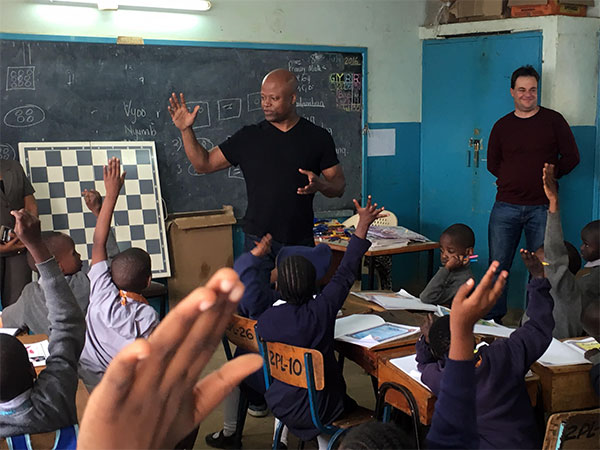
The goal is to make images like above a consistent reality
Such news does not come about every day, and, while I may call it a miracle, credit must be given to the Kasparov Chess Foundation for knocking on doors, pursuing leads and making it happen.
Roll forward another two months and the program is now poised to start. It has secured the services of Grandmaster Pontus Carlson, Grandmaster Kenny Solomon and myself and it will also employ some of the top master level trainers in Southern Africa. Together we will spend a total of 18 weeks training trainers, players and young people in the six selected countries. It is the start of something, a new beginning and an amazing opportunity to continue to spread our beloved game.
Imagine for a moment the future GMs will come out of this effort, players who will inspire not just a new generation of chess players but also others who will watch and see that success in every field is possible. That, of all things, would be the sweetest miracle of all!
Getting involved:
The “Chess Masters for Africa” program will see eighteen weeks of structured chess training provided across six African countries between February and June 2017. The program will provide structured training sessions in Botswana, Namibia, Zambia, Kenya, Rwanda and Tanzania and is expected to benefit more than sixty locally based trainers and more than 1,500 children across the African continent.
Access to books and training materials remains one of the biggest challenges for many African countries and the program is seeking to address this need as one of its key objectives. Anyone with access to good quality chess books who may wish to assist with this initiative is welcome to contact the KCF Africa Program Director, Mr Graham Jurgensen at info@kcfafrica.com.
Chessbase’s contribution
When we heard about this program, our management team at Chessbase quickly agreed to also get involved. We will hence be making copies of Chessbase 13/14 as well as a large selection of online training videos by Danny King, Karsten Mueller and Maurice Ashley available to the participating trainees in each country!
About Kasparov Chess Foundation Africa
The Kasparov Chess Foundation Africa is a public benefit organization focusing on the promotion of chess as a tool for education and social development across the African continent. The foundation operates under the patronage and chairmanship of the 13th World Chess Champion, GM Garry Kasparov and frequently co-operates with international partners to develop chess across the African continent. Link to Kasparov Chess Foundation - Africa site.
About Kasparov Chess Foundation (USA)
The Foundation promotes the study of chess as a cognitive learning tool in curricular classes and after-school programs for elementary, middle and high schools, both in the public and private school sectors. The not-for-profit Foundation also organizes regional, national, and worldwide tournaments, programs for talented students, and promotional chess events. Link to Kasparov Chess Foundation site.
About Paul G Allen Family Foundation
The Paul G Allen Family Foundation was founded in 1988 by Microsoft co-founder Paul Allen and has contributed funds to communities across Africa to improve education, technology infrastructures and health care access. Link to Paul G. Allen Family Foundation site.